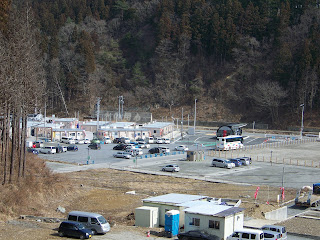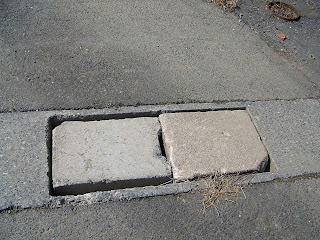In other news the weather has been absolutely horrible for the past week. Not only has it been rainy but the humidity hasn't dropped below 75% for quite a while (and is often above 85%), meaning that it's difficult to fall asleep and I lose my appetite. The humidity tends to increase at night so right when I'm getting up in the morning it's particularly bad. The shower-room gets very humid too and even though I set the temperature to the lowest "lukewarm" setting, it's still too warm. If I turn the heating-gas off completely then the water's WAY too cold to stand under since it's getting pumped up from underground. All I can do is splash the cold water on my hands and feet - I wish there were a "cool" temperature setting!
 |
| Yesterday's temperature and humidity from Accuweather. |
Speaking of the shower-room, we had an unexpected guest sneak in last week. As I was getting ready for the day, I heard Anne yell out that there was something small and black flying around the shower-room (she couldn't tell what it was since she didn't have her contacts in yet). It flew into Anne's room and landed at one of the ceiling's corners and we realized soon enough that it was a small bat. There are only a few mammals that I really dislike but mice and bats definitely come to mind first. When Anne tried to convince me to go around on the balcony and open her door from the outside so that the bat could fly out, at first I refused and said that we should go get a neighbor for help. One of the worst things about bats is that, like most rodents, they can carry all sorts of diseases like rabies. I guess it's good that we live in Japan since they have apparently eradicated rabies from the island, but still I'm sure the bats around here carry other kinds of crazy diseases. Anyway, I went around and slowly opened the door and then Anne made some loud noises by the doorway to scare the bat out of the door. It worked and the bat left but I was too freaked out to take a shower myself since I thought that the bat might try to come in again. My brother correctly pointed out afterward that if I had faced my fears, I might have become the next batman! Oh well, it was a missed opportunity I guess.
And more about bats - I've been re-watching the late 90's/early 2000's cartoon Batman Beyond which is a pretty decent show. But I'm still looking for an ongoing show to replace Young Justice - a cartoon I absolutely loved that was canceled in March. I really liked the characters in that show - I mean, they were all pretty annoying at first but then they changed over time and ended up being really awesome. I love when that happens! Like Zuko in Avatar: The Last Airbender! ... I won't apologize for liking cartoons!
OK, now for some student stories. A few weeks ago I was in class with the third year middle school students and Shingo-sensei told them to take out their handouts from the previous class. Maybe he had given them the handouts at the very end of the previous class or something because a bunch of the students were like 'Handout? What handout?' So the students looked through their binders and bags and eventually four students came to the front of the room to bow to Shingo-sensei and apologize for losing their worksheets. He gave them new handouts and told them to be more careful next time. I mean, usually there are one or two students who lose or forget worksheets but having four out of 22 students is pretty unusual especially considering that three of the students who asked for new worksheets hardly ever have to do so. So they were translating the reading from English to Japanese on the handout and I was walking around and helping students who needed it. Suddenly one of the four students who had asked for a second worksheet said that he had found his first worksheet. He returned the second copy of the handout since he hadn't written on it yet. Not one minute later, one of the other students called out that she had found her first worksheet as well (the class laughed when they heard the news). So she returned her second worksheet as well. After this there was anticipation in the air - would one of the other two students who had forgotten their handouts find theirs as well? Indeed about a minute later one of the two (who chronically loses and misplaces his worksheets) yelled out that he had found his first copy. The class thought this was quite funny (it was a few days before their semester exams so they were looking for any excuse to laugh). Anyway, the student returned his second worksheet, but he had written in some of the answers already which I also thought was funny.
Here are some pictures I took of one of the third year assignments where they had to explain something having to do with Japanese culture (as you might imagine, many students explained what 'sushi' was).
 |
| Kendo is very interesting to watch. I think this student was saying that it's traditionally done barefoot so her feet get cold in the winter. |
 |
| Another picture of a kendo match. |
 |
| This student decided to describe a kotatsu. I thought it was funny how he said that many Japanese people sleep under one because I've been told time and time again that it's dangerous to do so. |
 |
| I think this student was talking about Children's Day, but I don't know how the warrior Date Masamune got involved... |
Anyway, I had my last day at one of my elementary schools on Monday since this coming Monday is a holiday. It was really sad to say goodbye to all of my fifth and sixth grade students even though I told them that they would probably see me again before I left since I don't leave town until August 1st. Still, I was sad to go. I had to give several speeches over the course of the day, including one in front of the whole school which would have been stressful except that it was about one hundred and sixty degrees in the room (and humid!) so I can't really remember how I did since I was concentrating on not fainting.
I decided to make the elementary students bookmarks with stickers and their names on them, that way they'll have to remember how to write their names in English! The students really liked them (even more than I had expected), which made me happy.
I had told the elementary students previously that I was leaving and I had assumed all of the middle school students knew as well but when I mentioned it to one of my favorite students she said that she was surprised to hear it.
Me: But I'll see you next week at least.
Student: Next week I will be happy but then it will end.
Then she gave me a big hug.
We both had some tears in our eyes after that.
... Finally, here's a picture of a "Sugar Butter Sand Tree" treat, sounds appetizing, right?
 |
| I can understand the Sugar, Butter, and Sand (short for sandwich), but why the Tree? |
























































